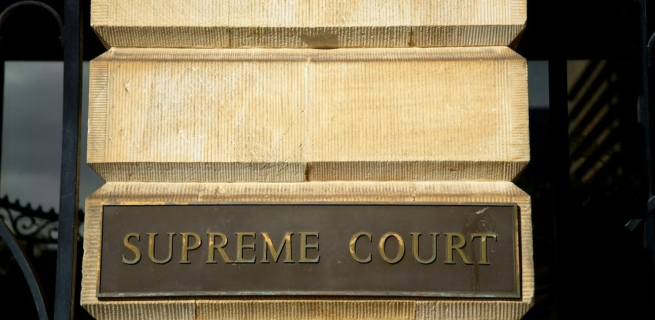By Paul Gregoire and Ugur Nedim
Ibrahim Ghazzawy was living in Sydney and is said to have adopted the Islamic State political outlook by the age of 18, at which point, in early 2014, he had his passport seized by Australian authorities as he planned to fly to Morocco, as it was claimed he sought to serve as a foreign fighter.
This interest in Islamic State coincided with the influence of a group of older men, who too shared the IS outlook. And a document was later located in one of these men’s premises, which was found to contain sketchily planned NSW terrorist actions that had been drafted by Ghazzawy.
The young man had created the document over two days after his travel was denied. The not so thoroughly planned acts included attacking Lithgow Gaol and AFP Sydney headquarters. And it had been considered by older associates and their comments and alterations had been added.
The defendant then pleaded guilty to a terror offence and a sentence of 8 years and 6 months was imposed, which was subsequently dropped to 8 years prison time, with non-parole set at 6 years, on appeal in 2021.
Due to restrictions on Australian terrorism offences, he served his entire sentence, as parole was denied.
And on release last December, Ghazzawy was placed on an interim supervision order, so that the Supreme Court of NSW could consider whether to place him on an extended supervision order to be served in the community.
Initial temporary supervision
The offence Ghazzawy was convicted and sentenced over in 2017 was making a document likely to facilitate terrorist acts, contrary to section 101.5 of the Criminal Code Act 1995 (Cth), which can see an individual sent away for up to 15 years prison time.
Divisions 101 to 103 of the Criminal Code contain federal terrorism offences. Section 19ALB of the Crimes Act 1914 (Cth) maintains that a person convicted of a federal terror offence cannot be released on parole, unless the Australian attorney general finds exceptional circumstances.
Needless to say, Ghazzawy was not found to have established exceptional circumstances to warrant parole prior to his head sentence expiring.
And prior to his release date, NSW Supreme Court Justice Richard Button considered whether he should place Ghazzawy on an interim supervision order (ISO) in line with the stipulations of section 105A.9A of the Criminal Code, which would serve to mimic the conditions of parole.
His Honour found that there were “reasonable grounds for considering that an extended supervision order (ESO) will be imposed upon the defendant”, so he placed him on an initial 28-day ISO, whilst the longer order was considered, and the ISO was extended until the final decision was made.
High-risk offenders
Turnbull attorney general George Brandis introduced the legislation establishing the high-risk terrorist offenders regime, via the Criminal Code Amendment (High-Risk Terrorist Offenders) Bill 2016, which permits for the application of an ESO, as well as continuing detention orders (CDO).
This regime, mirrored in most states and territories, is highly controversial as it permits convicted offenders sentenced to a specified time to serve for the crime the court convicted them over, then being slapped with further time or a freshly sentenced period of community supervision.
These post-sentence orders appear under division 105A of the Criminal Code, and they can be applied to division 101 terrorist act offences, division 102 crimes relating to terrorist organisations and division 103 financing terrorism offences, all of which must carry at least 7 years imprisonment.
The AG can determine to apply a CDO to a terrorist-related inmate for up to a further 3 years, and on expiry, this can be reinstated if a court finds necessary and there is no limit to these extensions. And ESOs can also be applied for up to 3 years, with no limit on subsequent orders.
Button’s determination
Section 105A.7A(1)(b) of the Criminal Code outlines that to determine whether a high-risk terrorist inmate should require extended supervision in the community, the fulcrum test must be conducted, which involves satisfaction on the balance of probabilities on the basis of admissible evidence.
On whether Ghazzawy required further supervision, Justice Button considered that the inmate had no convictions prior to the terror offence, that he was generally of good behaviour inside and that he had undertaken programs and the evidence showed he’d become deradicalised.
His Honour then referred to the testimonies of two experts, Dr Eagle and Mr Sheehan, who assessed Ghazzawy, and then considered that he could become radicalised again at some point in the future: at a point of crisis, where he might come to again blame Australian society and turn violent.
But Justice Button found that based on the inmate’s outlook, it would be unlikely he would engage in terrorism again without more radicalisation. And on the question of whether his old associates posed a threat of re-radicalising him, most of them are currently serving longer sentences.
On the balance of probabilities, his Honour was not satisfied that the risk posed by Ghazzawy turning again to terrorism warranted extended supervision, and he was neither satisfied that any risk of re-radicalisation would occur in the period of the 12-month ESO being contemplated.
“Finally, I accept that this outcome – whereby the defendant will have spent eight years in continuous custody for serious offending, followed by a mere three months subject to conditional liberty – is not conducive to his continuing rehabilitation,” Justice Button further found.
“But that is the consequence of a system of sentence administration that permits parole to be granted only on establishment of exceptional circumstances, combined with a system of imposition of subsequent conditional liberty without subsequent conviction,” his Honour concluded.
And on 7 March, Justice Button ordered the December imposed ISO be quashed, no ESO be imposed and that the attorney general pay Ghazzawy’s court costs.











